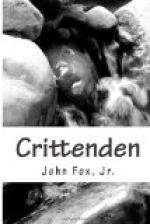“Why—why, bless my soul, aren’t you Tom Crittenden’s son?”
“Yes, sir,” said Crittenden.
“I knew it. Bless me, I was thinking of him just that moment—naturally enough—and you startled me. I thought it was Tom himself.” He grasped the Kentuckian’s hand warmly.
“Yes,” he said, studying his face. “You look just as he did when we courted and camped and fought together.” The tone of his voice moved Crittenden deeply. “And you are going to the war—good—good! Your father would be with me right now if he were alive. Come to see me right away. I may go to Tampa any day.” And, as he rode away, he stopped again.
“Of course you have a commission in the Legion.”
“No, sir. I didn’t ask for one. I was afraid the Legion might not get to Cuba.” The General smiled.
“Well, come to see me”—he smiled again—“we’ll see—we’ll see!” and he rode on with his hands still folded on the pommel of his saddle and his eyes still lifted, dreamily, upward.
It was guard-mount and sunset when Crittenden, with a leaping heart, reached Rivers’s camp. The band was just marching out with a corps of trumpeters, when a crash of martial music came across the hollow from the camp on the next low hill, followed by cheers, which ran along the road and were swollen into a mighty shouting when taken up by the camp at the foot of the hill. Through the smoke and faint haze of the early evening, moved a column of infantry into sight, headed by a band.
“Tramp, tramp, tramp,
The boys are marching!”
Along the brow of the hill, and but faintly seen through the smoky haze, came the pendulum-like swing of rank after rank of sturdy legs, with guidons fluttering along the columns and big, ghostly army wagons rumbling behind. Up started the band at the foot of the hill with a rousing march, and up started every band along the line, and through madly cheering soldiers swung the regiment on its way to Tampa—magic word, hope of every chafing soldier left behind—Tampa, the point of embarkation for the little island where waited death or glory.
Rivers was deeply dejected.
“Don’t you join any regiment yet,” he said to Crittenden; “you may get hung up here all summer till the war is over. If you want to get into the fun for sure—wait. Go to Tampa and wait. You might come here, or go there, and drill and watch for your chance.” Which was the conclusion Crittenden had already reached for himself.
The sun sank rapidly now. Dusk fell swiftly, and the pines began their nightly dirge for the many dead who died under them five and thirty years ago. They had a new and ominous chant now to Crittenden—a chant of premonition for the strong men about him who were soon to follow them. Camp-fires began to glow out of the darkness far and near over the old battlefield.




